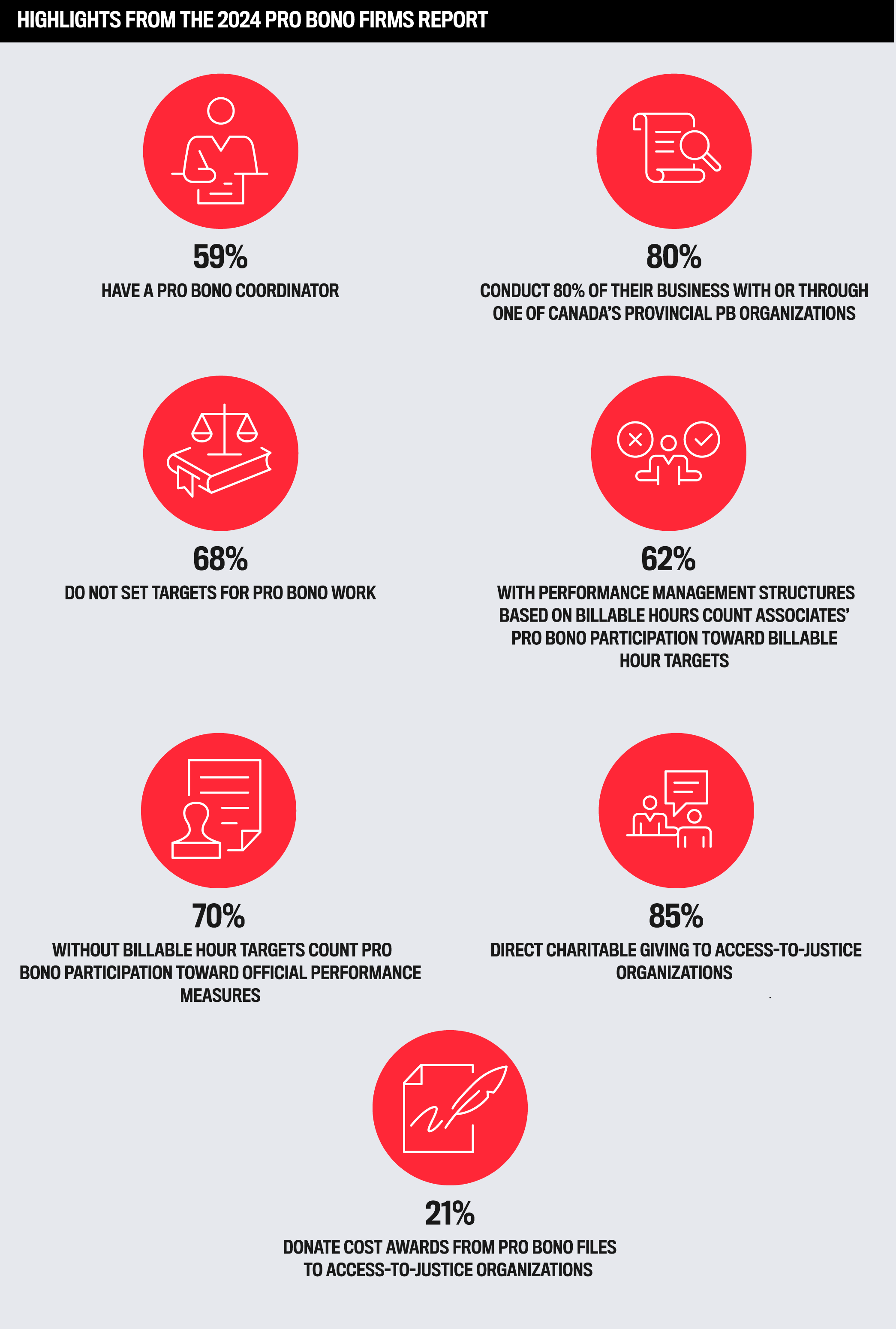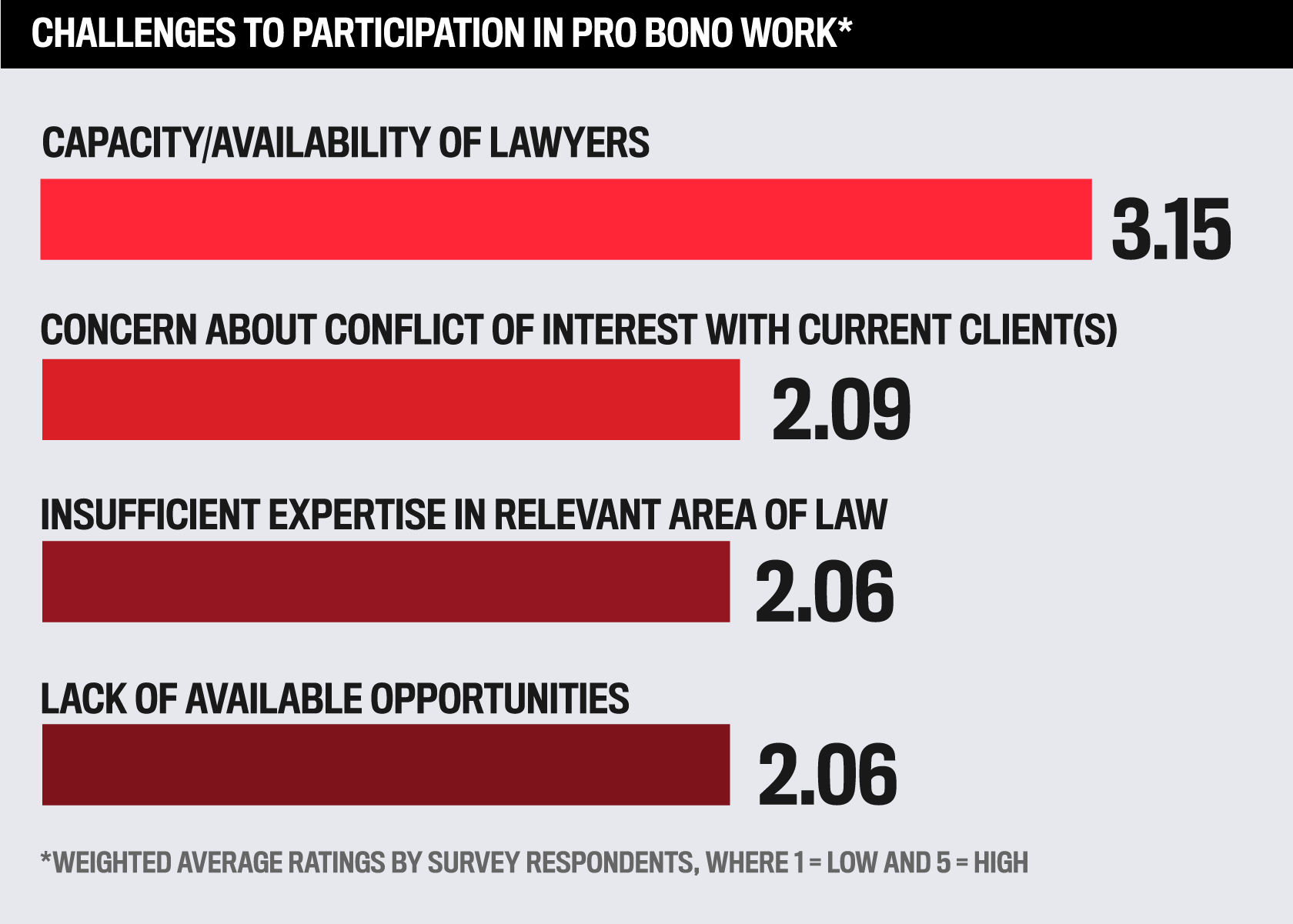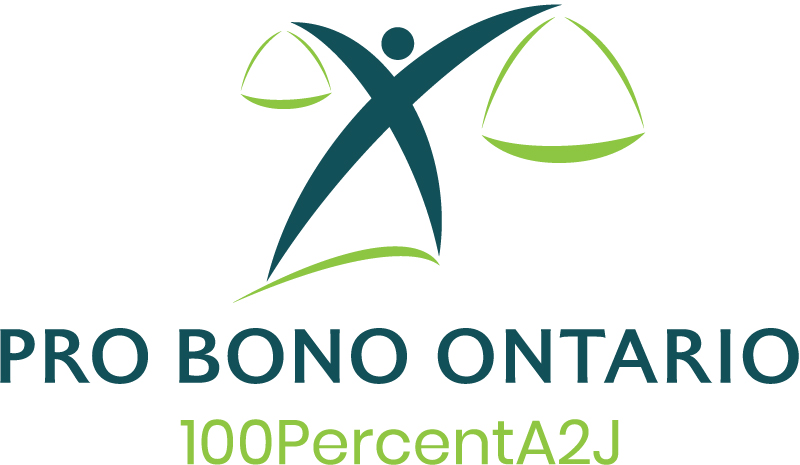

Jump to winners | Jump to methodology
The second edition of Canadian Lawyer’s 5-Star Pro Bono Firms recognizes the top law firms for their outstanding commitment to pro bono work.
The 2024 report also celebrates the diverse range of initiatives that have grown stronger and deliver millions of dollars of legal services free to people who need them most.

For the second consecutive year, Pro Bono Ontario (PBO) partnered with CL to identify the success factors that enable pro bono participation at an institutional level.
The organization’s support for the national survey included assessing transparent and replicable measures that account for differences between individual practices, such as the number of pro bono hours donated per lawyer or the practice of directing financial support to access-to-justice initiatives.
From a pool of more than 50 prominent nominees, the 21 best pro bono law firms nationwide demonstrated excellence in practices and policies they’ve put in place to promote their pro bono work and build upon their contribution, including:
implementing formal structures such as pro bono policies, a committee, or a senior person to provide leadership
counting pro bono time toward lawyers’ targets
facilitating the engagement of interested lawyers
directing charitable giving to access-to-justice organizations
treating pro bono work as central to their business
“At Pro Bono Ontario, we’ve certainly seen the value that pro bono work can have over the lifetime of a lawyer’s career,” says PBO executive director Kirsti Mathers McHenry. “For younger lawyers, getting involved gives them opportunities to develop their practice, take on particular cases, and develop their skills within a supportive environment.”


The increased participation rate in pro bono work seen this year among the awardees is evidence of a strong and growing commitment to make a difference, adds Mathers McHenry.
“The survey also shows the huge potential for legal departments and in-house teams to contribute to pro bono efforts, which is great to see,” she adds. “What stands out to me is the diversity and range of engagement. The approaches lawyers and firms are coming up with to give back serve as powerful tools to move the needle on access to justice.”
PBO served 34,295 clients in 2023 via its volunteer-run, free legal advice hotline. But that staggering number represents only about half of the people who called in need of legal assistance, notes PBO board chair Sarah Armstrong, a recognized pro bono legal support champion and a partner at Fasken Martineau DuMoulin LLP, a two-time 5-Star Pro Bono award recipient.
“Those lawyers answering the calls are making a difference in helping people with civil legal problems and addressing a massive access-to-justice gap,” she says.
For the mid-sized regional Aboriginal law litigation boutique headquartered in British Columbia, its exemplary dedication to pro bono work is deeply woven into its culture and driven by the following principles:
addressing access-to-justice issues
honouring the relationship with Indigenous Peoples and their shared value of reciprocity by giving back to those in need of legal services
“Access-to-justice issues come to the fore with Indigenous Peoples, with everything from employment law matters to human rights matters,” says managing partner Sara Mainville.
She adds, “When you’re dealing with Indigenous Peoples and what issues come to bear when they’re trying to defend their rights, it gets complicated because of Canada’s history and the need for reconciliation, which is still very much an unfinished project.”
The firm has prioritized helping institutions meet the Truth and Reconciliation Commission calls to action and conforming to the United Nations Declaration on the Rights of Indigenous Peoples.


JFK Law’s pro bono contributions also include:
working with several universities on issues related to Indigenous identity and Indigenous relationships with universities that are in Indigenous Peoples’ territories, and how to better reflect the relationship between First Nations and post-secondary institutions
assisting Indigenous People who are not being dealt with sensitively or respectfully by an institution, such as an ongoing case involving the Law Society of Ontario in a conduct matter with an Indigenous licensee
offering low bono and joint retainers on Indigenous legal issues that could spearhead progress
“We lend ourselves as expert navigators and legal counsel in these roles and, in some of these circumstances concerning the Indigenous person involved, that’s not their responsibility to educate these institutions about these things, so we find that is an important cause for us to take on in our pro bono files,” she says.
JFK Law makes its debut among the best pro bono law firms in Canada, underscoring its enduring reputation as a top-tier firm on Indigenous legal issues and fearless Indigenous rights advocacy.
As the firm has expanded in scope and expertise with a strong presence across Canada from multiple offices, its legal team has increasingly emphasized nation-building, governance, and duty-to-consult work. Two partners, Robert Janes, KC and Karey Brooks, KC, have appeared at the Supreme Court of Canada advocating for Indigenous rights under Section 35 of the Constitution Act 1982, the protection of Aboriginal and Treaty Rights.
“In the next year, we’ll probably see one of the most progressive modern treaties signed between one of our clients in British Columbia and Canada,” Mainville remarks. “This modern treaty negotiation sets the path forward in a comprehensive arrangement for the relationship between British Columbia, Canada, and those nations.”
JFK Law’s pro bono commitment has profoundly impacted the client group it serves, who needs access-to-legal information and specific interventions often out of financial reach.
“We try our best to utilize our pro bono resources to help them in those significant ways,” says Mainville. “Our pro bono test is, generally, will it be helpful to our client group, will it have an impact, or set the pathway forward for other people.”
The 5-Star Pro Bono law firm also shares the learnings from its cases with the Indigenous community through regular blog posts on its website, ensuring awareness of the ways forward when legal barriers arise.
At the leading firm, a culture of pro bono service is encouraged in several ways:
providing opportunities for junior lawyers to get experience working on pro bono cases efficiently, which tend to be cutting-edge legal issues
utilizing their pro bono budget and encouraging young lawyers to do at least 50 pro bono hours annually
“There’s a lot of work out there and so many good cases that we would like to take on, but a major challenge we have to deal with is a lack of resources within the justice system overall and how long it takes to get to a hearing,” notes Mainville. “That length of time makes these things more expensive. If the justice system becomes more efficient, we could help more people. But that’s one of the things that we know is a barrier and constrains the work that we do.”
One method to combat the resources challenge is a matter of collegiality and working with other organizations or law firms on pro bono matters to spread the burden while ensuring the right mix of expertise.
“I think pro bono work is a good opportunity to collaborate,” she adds. “It’s a good opportunity to work with different regions and firms focused on legal advocacy and public legal work,” she adds.

Pro Bono Ontario’s Mathers McHenry and Armstrong echo JFK Law’s alliance-building approach to pro bono work, highlighting that as cases become more sophisticated and time-consuming, there are many ways committed lawyers can become involved across the country:
volunteer to provide brief services at dedicated clinics or remotely
law firms could incorporate targets and incentives to encourage more lawyers to contribute a small amount toward the access-to-justice crisis
“At Fasken, we make a point of ensuring that we’re celebrating pro bono wins and letting others know about the great things that their colleagues have done on a pro bono basis because it engenders goodwill and encourages other people to want to do the same kind of work,” Armstrong says.
She and her colleagues have been working pro bono on a consumer protection initiative that negatively impacts vulnerable seniors via predatory sales tactics.
One such case involved an elderly couple falling victim to murky door-to-door sales practices, resulting in an unfair contract promising energy-saving benefits. The ordeal reached a boiling point when the business served them with a notice of security interest on their home, causing severe stress.
The Fasken legal team intervened with a small claims court action, successfully nullifying the contract and removing the notice.
“Many of us went to law school because we want to help people,” says Armstrong. “I think the challenge lies in our busy lives and practices, but firms that promote a pro bono culture make it easy for the lawyers to do this work.”


Canadian Lawyer’s second annual 5-Star Pro Bono Firms special report recognizes Canada’s law firms that demonstrate pro bono infrastructure at an institutional level. The assessment criteria are evidence of pro bono infrastructure (e.g., pro bono committee, ability to quantify partner participation, etc.), count of pro bono time as billable time/toward targets (for large/national firms only), cost awards/charitable giving to access-to-justice organizations, and minimum five hours per lawyer pro bono time or active pro bono programs for in-house legal departments.
The Pro Bono Ontario and CL teams reviewed all nominations, examining how each firm had made a meaningful contribution to the industry – along with benchmarking against the other entries – to determine the 21 5-Star Pro Bono Firms.
The 5-Star Pro Bono Firms report is proudly supported by Pro Bono Ontario.

Pro Bono Ontario (PBO) is an access-to-justice charity founded in 2001. PBO’s mission is to harness the skills and commitment of volunteer lawyers to address low-income Ontarians’ unmet civil law problems to help them lead secure, healthy, and productive lives. PBO delivers on this mission by developing and directly managing pro bono programs that enable lawyers to provide high-quality legal services to those who cannot afford a lawyer or qualify for government-funded legal assistance. Since its creation, PBO has provided direct legal services to 300,000 clients who had nowhere else to turn for their everyday legal problems.